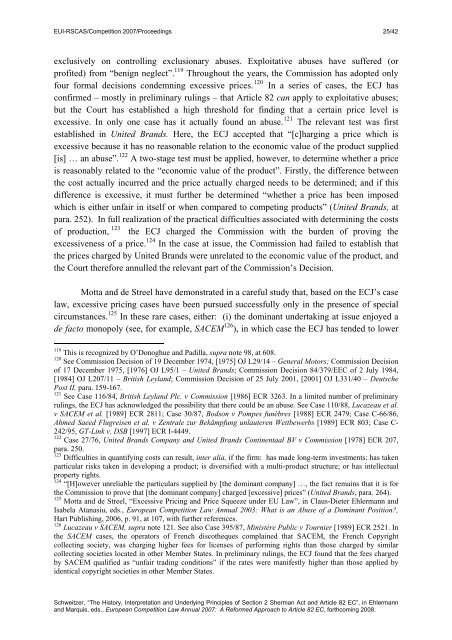The History, Interpretation and Underlying Principles of Section
The History, Interpretation and Underlying Principles of Section
The History, Interpretation and Underlying Principles of Section
Create successful ePaper yourself
Turn your PDF publications into a flip-book with our unique Google optimized e-Paper software.
EUI-RSCAS/Competition 2007/Proceedings 25/42<br />
exclusively on controlling exclusionary abuses. Exploitative abuses have suffered (or<br />
pr<strong>of</strong>ited) from “benign neglect”. 119 Throughout the years, the Commission has adopted only<br />
four formal decisions condemning excessive prices. 120 In a series <strong>of</strong> cases, the ECJ has<br />
confirmed – mostly in preliminary rulings – that Article 82 can apply to exploitative abuses;<br />
but the Court has established a high threshold for finding that a certain price level is<br />
excessive. In only one case has it actually found an abuse. 121 <strong>The</strong> relevant test was first<br />
established in United Br<strong>and</strong>s. Here, the ECJ accepted that “[c]harging a price which is<br />
excessive because it has no reasonable relation to the economic value <strong>of</strong> the product supplied<br />
[is] … an abuse”. 122 A two-stage test must be applied, however, to determine whether a price<br />
is reasonably related to the “economic value <strong>of</strong> the product”. Firstly, the difference between<br />
the cost actually incurred <strong>and</strong> the price actually charged needs to be determined; <strong>and</strong> if this<br />
difference is excessive, it must further be determined “whether a price has been imposed<br />
which is either unfair in itself or when compared to competing products” (United Br<strong>and</strong>s, at<br />
para. 252). In full realization <strong>of</strong> the practical difficulties associated with determining the costs<br />
<strong>of</strong> production, 123 the ECJ charged the Commission with the burden <strong>of</strong> proving the<br />
excessiveness <strong>of</strong> a price. 124 In the case at issue, the Commission had failed to establish that<br />
the prices charged by United Br<strong>and</strong>s were unrelated to the economic value <strong>of</strong> the product, <strong>and</strong><br />
the Court therefore annulled the relevant part <strong>of</strong> the Commission’s Decision.<br />
Motta <strong>and</strong> de Streel have demonstrated in a careful study that, based on the ECJ’s case<br />
law, excessive pricing cases have been pursued successfully only in the presence <strong>of</strong> special<br />
circumstances. 125 In these rare cases, either: (i) the dominant undertaking at issue enjoyed a<br />
de facto monopoly (see, for example, SACEM 126 ), in which case the ECJ has tended to lower<br />
119<br />
This is recognized by O’Donoghue <strong>and</strong> Padilla, supra note 98, at 608.<br />
120<br />
See Commission Decision <strong>of</strong> 19 December 1974, [1975] OJ L29/14 – General Motors; Commission Decision<br />
<strong>of</strong> 17 December 1975, [1976] OJ L95/1 – United Br<strong>and</strong>s; Commission Decision 84/379/EEC <strong>of</strong> 2 July 1984,<br />
[1984] OJ L207/11 – British Leyl<strong>and</strong>; Commission Decision <strong>of</strong> 25 July 2001, [2001] OJ L331/40 – Deutsche<br />
Post II, para. 159-167.<br />
121<br />
See Case 116/84, British Leyl<strong>and</strong> Plc. v Commission [1986] ECR 3263. In a limited number <strong>of</strong> preliminary<br />
rulings, the ECJ has acknowledged the possibility that there could be an abuse. See Case 110/88, Lucazeau et al.<br />
v SACEM et al. [1989] ECR 2811; Case 30/87, Bodson v Pompes funèbres [1988] ECR 2479; Case C-66/86,<br />
Ahmed Saeed Flugreisen et al. v Zentrale zur Bekämpfung unlauteren Wettbewerbs [1989] ECR 803; Case C-<br />
242/95, GT-Link v. DSB [1997] ECR I-4449.<br />
122<br />
Case 27/76, United Br<strong>and</strong>s Company <strong>and</strong> United Br<strong>and</strong>s Continentaal BV v Commission [1978] ECR 207,<br />
para. 250.<br />
123<br />
Difficulties in quantifying costs can result, inter alia, if the firm: has made long-term investments; has taken<br />
particular risks taken in developing a product; is diversified with a multi-product structure; or has intellectual<br />
property rights.<br />
124<br />
“[H]owever unreliable the particulars supplied by [the dominant company] …, the fact remains that it is for<br />
the Commission to prove that [the dominant company] charged [excessive] prices” (United Br<strong>and</strong>s, para. 264).<br />
125<br />
Motta <strong>and</strong> de Streel, “Excessive Pricing <strong>and</strong> Price Squeeze under EU Law”, in Claus-Dieter Ehlermann <strong>and</strong><br />
Isabela Atanasiu, eds., European Competition Law Annual 2003: What is an Abuse <strong>of</strong> a Dominant Position?,<br />
Hart Publishing, 2006, p. 91, at 107, with further references.<br />
126<br />
Lucazeau v SACEM, supra note 121. See also Case 395/87, Ministère Public v Tournier [1989] ECR 2521. In<br />
the SACEM cases, the operators <strong>of</strong> French discotheques complained that SACEM, the French Copyright<br />
collecting society, was charging higher fees for licenses <strong>of</strong> performing rights than those charged by similar<br />
collecting societies located in other Member States. In preliminary rulings, the ECJ found that the fees charged<br />
by SACEM qualified as “unfair trading conditions” if the rates were manifestly higher than those applied by<br />
identical copyright societies in other Member States.<br />
Schweitzer, “<strong>The</strong> <strong>History</strong>, <strong>Interpretation</strong> <strong>and</strong> <strong>Underlying</strong> <strong>Principles</strong> <strong>of</strong> <strong>Section</strong> 2 Sherman Act <strong>and</strong> Article 82 EC”, in Ehlermann<br />
<strong>and</strong> Marquis, eds., European Competition Law Annual 2007: A Reformed Approach to Article 82 EC, forthcoming 2008.

















